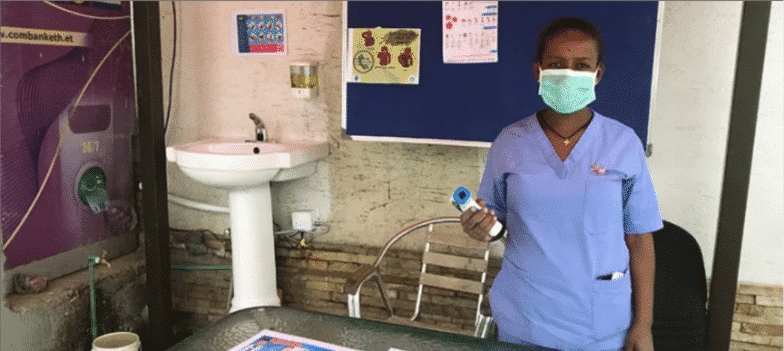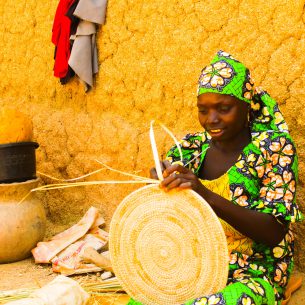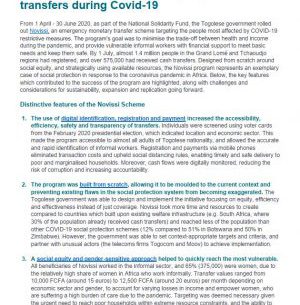
It is no surprise that women-led countries have suffered six times fewer confirmed COVID-19 deaths than countries led by men, according to a University of Dublin study. Women leaders are better placed to draw on informal networks to mobilize rapid responses and community support. They are used to finding alternative resources and building ingenious partnerships to solve problems. And with greater numbers of women at the forefront of policy decisions, these skills are coming to the fore.
In Africa, the challenges to contain the disease are multiple: Our cities are often densely populated, many health care systems are limited, and many homes and even hospitals lack proper sanitation. Leading my country through the Ebola outbreak taught me a lot about dealing with an infectious disease in Africa. We need to be creative in finding home-grown solutions to keep people safe.
At the beginning of March, as COVID-19 was making its way over Europe but had yet to reach Africa, we gathered the first cohort of 15 women from across the continent to take part in a program to advance women’s public leadership in Africa.
Developing plans of action to combat the spread of the virus in their communities became front and center on the agenda for this Amujae initiative — the flagship program of the Ellen Johnson Sirleaf Presidential Center for Women and Development.
As these women — whom we call Amujae Leaders — returned home, and as the virus quickly spread, they got to work with impressive results.
One of the public leaders at the forefront of West Africa’s response is the mayor of Freetown, Sierra Leone, Yvonne Aki-Sawyerr. Not only is she mobilizing support across her city to deliver behavior-change messaging and provide practical help such as masks for citizens in the immediate fight against the virus, she is also accelerating plans to address long-term issues in Freetown’s infrastructure that will deliver improvements to public health initiatives.
In Rwanda, cabinet member Clare Akamanzi has been actively involved in her country’s response to the pandemic, led by President Paul Kagame. Serving as part of Rwanda’s COVID-19 task force, chaired by Prime Minister Édouard Ngirente, under the supervision of the president, Clare has led a coordinated effort to combat the virus by organizing isolation centers, sourcing personal protective equipment and testing kits, and creating plans for the post-virus recovery, including a detailed plan to restart tourism — a vital pillar of the country’s economy.
While the initiative is working to advance equity for women in formal public leadership roles, we shouldn’t discount the importance of the many informal roles played by women in their communities, particularly regarding sharing information.
When Ghanaian Member of Parliament Dr. Zanetor Agyeman-Rawlings returned to her community in March, she targeted women with messages about the importance of good hygiene to prevent the spread of COVID-19, visiting local businesses, eateries, markets, and transport hubs. She reported that women were not only receptive to the messages and understood their importance, but also began to share them across their own constituencies in their capacity as informal community leaders.
Public awareness is at the heart of Blen Sahilu’s response in Ethiopia. With a large social media following and an understanding of its potential to galvanize efforts within communities, she set about using online platforms to share public information messages in multiple languages across the country. Subsequently, she was able to target mainstream media, helping to reshape the tone of coverage to ensure that people took the threat seriously.
Cornelia Kruah-Togba knew that swift action would be an important factor in battling the spread of the virus and the rumors surrounding it in Liberia. In addition to installing hand-washing stations at gathering places and busy intersections, she has coordinated public information campaigns to encourage people to adhere to public health guidelines designed to keep them safe.
Women and girls are being particularly affected by the pandemic, in areas such as health care, education, and personal safety. Across the continent, many clinics and health care centers offering women’s reproductive health care have closed or are now focusing their efforts on dealing with COVID-19.
Kula Fofana has launched an effort in Liberia to support pregnant women during the crisis. In addition to gathering donations of the essential items that pregnant or birthing women need, she has organized birth classes with OB-GYNs and registered midwives, enabling women to ask important questions about general birth preparedness and COVID-19 prevention.
Amid the COVID-19 crisis, girls’ education is also at risk. Maintaining distance learning while schools are closed is essential, especially for girls who are at higher risk of dropping out of school completely.
With limited internet access in her country, Côte d’Ivoire Country Manager at Teaching at the Right Level Aïda Alassane N’Diaye-Riddick is helping children access education through radio programs.
There are now plans in place to support this with SMS content for parents in remote areas, helping more children access education throughout the pandemic and beyond.
Beyond the immediate health implications of the pandemic, women should also be at the forefront of planning for economic recovery. Malado Kaba, the first woman to serve as economy and finance minister for the Republic of Guinea, has carried out a survey of 100 companies to understand the economic impact of the crisis and help inform her country’s effective mitigation strategies. She is advocating for actions to support key sectors of the economy, including pushing for local content policies.
As Yawa Hansen-Quao pointed out, the COVID-19 pandemic has shone a spotlight on the “importance of women in leadership and their ability to keep control of a crisis.” The pace of change for women’s public leadership has not been quick enough — but there are actions that African governments and their international development partners can take now to accelerate progress.
I call on all heads of state across Africa to appoint more women to their cabinets and to the task forces established to tackle this pandemic.
This would unlock manifold benefits for their countries and economies and send a signal that they are serious about doing what’s best for all.
And I call on our global development and philanthropic partners to double down on investments in women’s leadership. It will pay dividends today and well into the future.







